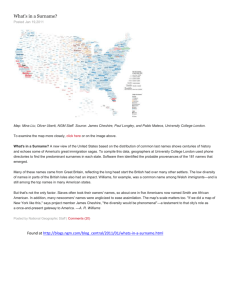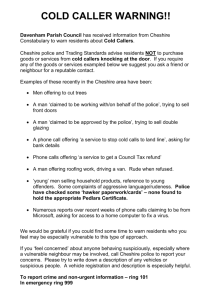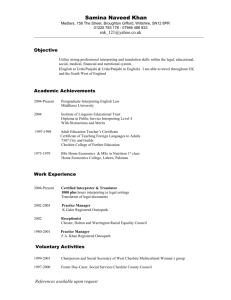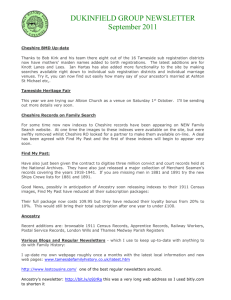BMI South Cheshire Private Hospital Quality Accounts
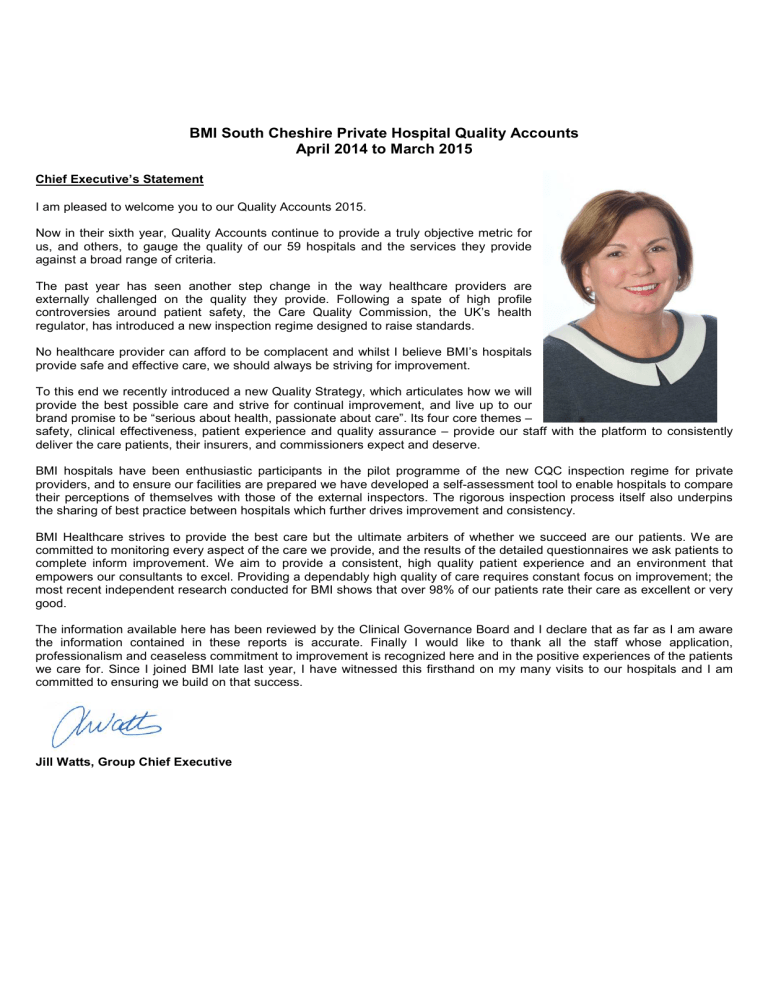
BMI South Cheshire Private Hospital Quality Accounts
April 2014 to March 2015
Chief Executive’s Statement
I am pleased to welcome you to our Quality Accounts 2015.
Now in their sixth year, Quality Accounts continue to provide a truly objective metric for us, and others, to gauge the quality of our 59 hospitals and the services they provide against a broad range of criteria.
The past year has seen another step change in the way healthcare providers are externally challenged on the quality they provide. Following a spate of high profile controversies around patient safety, the Care Quality Commission, the UK’s health regulator, has introduced a new inspection regime designed to raise standards.
No healthcare provider can afford to be complacent and whilst I believe BMI’s hospitals provide safe and effective care, we should always be striving for improvement.
To this end we recently introduced a new Quality Strategy, which articulates how we will provide the best possible care and strive for continual improvement, and live up to our brand promise to be “serious about health, passionate about care”. Its four core themes – safety, clinical effectiveness, patient experience and quality assurance – provide our staff with the platform to consistently deliver the care patients, their insurers, and commissioners expect and deserve.
BMI hospitals have been enthusiastic participants in the pilot programme of the new CQC inspection regime for private providers, and to ensure our facilities are prepared we have developed a self-assessment tool to enable hospitals to compare their perceptions of themselves with those of the external inspectors. The rigorous inspection process itself also underpins the sharing of best practice between hospitals which further drives improvement and consistency.
BMI Healthcare strives to provide the best care but the ultimate arbiters of whether we succeed are our patients. We are committed to monitoring every aspect of the care we provide, and the results of the detailed questionnaires we ask patients to complete inform improvement. We aim to provide a consistent, high quality patient experience and an environment that empowers our consultants to excel. Providing a dependably high quality of care requires constant focus on improvement; the most recent independent research conducted for BMI shows that over 98% of our patients rate their care as excellent or very good.
The information available here has been reviewed by the Clinical Governance Board and I declare that as far as I am aware the information contained in these reports is accurate. Finally I would like to thank all the staff whose application, professionalism and ceaseless commitment to improvement is recognized here and in the positive experiences of the patients we care for. Since I joined BMI late last year, I have witnessed this firsthand on my many visits to our hospitals and I am committed to ensuring we build on that success.
Jill Watts, Group Chief Executive
BMI The South Cheshire Private Hospital
A 32 bedded Independent Hospital registered with the Care Quality Commission, with 2 Operating Theatres,
Consulting Suite with 10 Consulting Rooms plus a minor procedure room. The hospital is registered to provide care for Adults and children over the age of 3 years. The hospital provides care for private and NHS patients. The hospital is located on the site of Mid Cheshire Hospitals Foundation Trust (Leighton Hospital) and works in partnership with the Trust and has Service Level Agreements for the provision of specialist clinical support services from the Trust
Currently the hospital experiences 60% of its activity as NHS patients compared to overall activity. A Standard
Acute Contract is in place with local NHS commissioners covering most of the surgical specialties
BMI Healthcare are registered as a provider with the Care Quality Commission (CQC) under the Health & Social
Care Act 2008. BMI The South Cheshire Private Hospital is registered as a location for the following regulated services:-
•
Treatment of disease, disorder and injury
•
Surgical procedures
•
Diagnostic and screening
•
Family Planning – for the purposes of insertion of coils for disease management
The CQC carried out an unannounced inspection on 8 th
October 2013 and found full compliance with standards below; the full report can be reviewed on the CQC website
Treating people with respect and involving them in their care
Providing care, treatment and support that meets people’s needs
Caring for people safely and protecting them from harm
Staffing
Quality and suitability of management
The South Cheshire Private Hospital has a local framework through which clinical effectiveness, clinical incidents and clinical quality is monitored and analysed. Where appropriate, action is taken to continuously improve the quality of care. This is through the work of a multidisciplinary group and the Medical Advisory Committee.
Regional Clinical Quality Assurance Groups monitor and analyse trends and ensure that the quality improvements are operationalised.
At corporate level the Clinical Governance Board has an overview and provides the strategic leadership for corporate learning and quality improvement.
There has been ongoing focus on robust reporting of all incidents, near misses and outcomes. Data quality has been improved by ongoing training and database improvements. New reporting modules have increased the speed at which reports are available and the range of fields for analysis. This ensures the availability of information for effective clinical governance with implementation of appropriate actions to prevent recurrences in order to improve quality and safety for patients, visitors and staff.
At present we provide full, standardised information to the NHS, including coding of procedures, diagnoses and co-morbidities and PROMs for NHS patients. There are additional external reporting requirements for CQC, Public
Health England (Previously HPA) CCGs and Insurers
BMI is a founding member of the Private Healthcare Information Network (PHIN) UK – where we produce a data set of all patient episodes approaching HES-equivalency and submit this to PHIN for publication. The data is made available to common standards for inclusion in comparative metrics, and is published on the PHIN website http://www.phin.org.uk
. This website gives patients information to help them choose or find out more about an independent hospital including the ability to search by location and procedure.
1. Safety
1.1 Infection prevention and control
The focus on infection prevention and control continues under the leadership of the Group Director of Infection Prevention and Control and Group Head of
Infection Prevention and Control, in liaison with the Infection Prevention and
Control Lead at the South Cheshire Private Hospital.
We have had: -
•
Zero cases of MRSA bacteraemia in the last year
•
Zero MSSA bacteraemia cases
•
Zero E.coli bacteraemia cases
•
Zero of hospital apportioned Clostridium difficile in the last 12 months.
•
SSI data is also collected and submitted to Public Health England for orthopaedic surgical procedures.
Our rates of infection, from April 2014 to March 2015 are; o Hips – 0% o Knees – 0%
The results of the Infection Prevention and Control environmental audits for the period of October 2014 – March
2015 are shown in the graph below.
100%
98%
96%
94%
92%
90%
88%
86%
84%
82%
80%
96%
Changing
Rooms
94%
Consulting
Suite
96%
Physio
93%
Theatre
91%
Ward A
91%
Ward B
90%
X-ray
Environmental cleanliness is also an important factor in infection prevention and our patients rate the cleanliness of our facilities
highly
1.2 Patient Led Assessment of the Care Environment (PLACE)
We believe a patient should be cared for with compassion and dignity in a clean, safe environment. Where standards fall short, they should be able to draw it to the attention of managers and hold the service to account. PLACE assessments will provide motivation for improvement by providing a clear message, directly from patients, about how the environment or services might be enhanced.
In 2013 we introduced PLACE, which is the new system for assessing the quality of the patient environment, replacing the old Patient Environment Action Team (PEAT) inspections. 2014 was the second year the audit was completed
The assessments involve patients and staff who assess the hospital and how the environment supports patient’s privacy and dignity, food, cleanliness and general building maintenance. It focuses entirely on the care environment and does not cover clinical care provision or how well staff are doing their job.
The results will show how hospitals are performing nationally and locally. Results of the South Cheshire Private hospital from 2014 are:
Cleanliness
Food & Hydration
Privacy & Dignity
Condition, Appearance
& Maintenance
SCPH
Score
2014
National
Average
97.27% 97.25%
90.06% 89.09%
92.59% 87.73%
85.71% 91.79%
National
Range
24.06-100
36.25-100
52.26-100
26.67-100
The result for condition, appearance and maintenance is slightly below the national average action plans are in place to address the perceived areas for improvement
1.3
Venous Thrombo-embolism (VTE)
BMI Healthcare, holds VTE Exemplar Centre status by the Department of Health across its whole network of hospitals including, The South Cheshire Private Hospital. BMI Healthcare was awarded the Best VTE Education
Initiative Award category by Lifeblood in February 2013 and were the Runners up in the Best VTE Patient
Information category.
We see this as an important initiative to further assure patient safety and care. We audit our compliance with our requirement to VTE risk assessment every patient who is admitted to our facility and the results of our audit on this has shown. VTE assessment normally runs at a full 100%, the processes are embedded in the care pathways for relevant patients and are highlighted as an integral part of the care pathway documentation.
The South Cheshire Private Hospital reports the incidence of Venous Thromboembolism (VTE) through the corporate clinical incident system. It is acknowledged that the challenge is receiving information for patients who may return to their GPs or other hospitals for diagnosis and/or treatment of VTE post discharge from the Hospital.
As such we may not be made aware of them. We continue to work with our Consultants and referrers in order to ensure that we have as much data as possible. .
There were no incidents of DVT in 2014 and so far this year which is a positive outcome and the graph visually demonstrates the improvement since 2012
2. Effectiveness
2.1 Patient reported Outcomes (PROMS)
Patient Reported Outcome Measures (PROMs) are a means of collecting information on the effectiveness of care delivered to NHS patients as perceived by the patients themselves. PROMS is a Department of Health led programme.
PROMS participation rates can be variable due to factors outside our control. The initial pre-operative questionnaire is given to each eligible patient; however we have no control on ensuring that the second stage questionnaire is completed and returned. There are plans to put in place a process to send out a reminder to the participating patients at around the time the second questionnaire is sent out that firstly they should expect the arrival of the questionnaire and secondly the importance of completion and returning
During this period the numbers of Hip and Knee replacements were below the required level of 30 for reporting purposes and so no local scores have been published. Last year was a positive outcome and there is no reason to believe that the performance has changed.
As detailed further on in the quality account PROMS results for Groin Hernia – the result was a marginal decline of -0.054.
2.2 Enhanced Recovery Programme (ERP)
The ERP is about improving patient outcomes and speeding up a patient’s recovery after surgery. ERP focuses on making sure patients are active participants in their own recovery and always receive evidence based care at the right time. It is often referred to as rapid recovery, is a new, evidence-based model of care that creates fitter patients who recover faster from major surgery. It is the modern way for treating patients where day surgery is not appropriate.
ERP is based on the following principles:-
1. All Patients are on a pathway of care a. Following best practice models of evidenced based care b. Reduced length of stay
2. Patient Preparation a. Pre Admission assessment undertaken b. Group Education sessions c. Optimizing the patient prior to admission – i.e HB optimisation, control co-morbidities, medication assessment – stopping medication plan. d. Commencement of discharge planning
3. Proactive patient management a. Maintaining good pre-operative hydration b. Minimising the risk of post-operative nausea and vomiting c. Maintaining normothermia pre and post operatively d. Early mobilisation
4. Encouraging patients have an active role in their recovery a. Participate in the decision making process prior to surgery b. Education of patient and family c. Setting own goals daily d. Participate in their discharge planning
ERP processes are well advanced at The South Cheshire Private Hospital. The average length of stay for joint replacement is below 3.4 days. Recent initiatives have involved the anaesthetic element of the pathway, as the local anaesthetists had been devising an appropriate anaesthetic and pain relief protocol that enhanced ERP processes and further reduced length of stay by allowing for earlier mobilisation of patients post-operatively. This involved modification of the types of anaesthetic blocks used, and the withdrawal of routine use of opiate pain relief pumps. This protocol has now been implemented at the local Trust and has been introduced at the The
South Cheshire Private Hospital
2.3 Unplanned Readmissions within 31 days and unplanned returns to theatre.
Unplanned readmissions and unplanned returns to theatre are normally intrinsically linked as patient mix is predominantly surgical and so would be due to a clinical complication related to the original surgery. 2014 has seen an increase on previous years and although there are no significantly relevant trends, a number of the returns have been again linked to post-surgical haematomas particularly in Gynaecology and General Surgery. As indicated although there are no identifiable trends the situation is being monitored by the hospital’s clinical
governance committee. It is believed that the higher uptake of NHS Choose & Book patients who have been recognised as having higher rates of co-morbidities and complications maybe influencing this measure.
3. Patient experience
3.1 Patient satisfaction
BMI Healthcare is committed to providing the highest levels of quality of care to all of our patients. We continually monitor how we are performing by asking patients to complete a patient satisfaction questionnaire. Patient satisfaction surveys are administered by an independent third party.
The above data shows extremely positive patient perception of our service, the weakest performing category is the discharge process. A working party has been established to develop an action plan to address the identified weaknesses and areas for improvement within the patient discharge process.
3.2 Complaints
In addition to providing all patients with an opportunity to complete a satisfaction survey BMI The South Cheshire
Private Hospital actively encourages feedback both informally and formally. Patients are supported through a robust complaints procedure, operated over three stages:
Stage 1: Hospital resolution
Stage 2: Corporate resolution
Stage 3: Patients can refer their complaint to independent adjudication if they are not satisfied with the outcome at the other 2 stages.
.
Written complaints are at similar levels in 2013/14 and have reduced consistently from 2011 onwards, the above rate includes both private and NHS patients, and there is a significant proportion of financially related complaints which if extracted would reduce the already reasonably low rate of complaints even lower. There are no specific trends in the nature of the complaints, however within the context of some complaints communication on discharge and length of time between admission and transfer to theatres have been raised – these aspects are mirrored in the patient satisfaction surveys undertaken, and are a focus in our service delivery improvement plan this year
4. CQUINS
The agreed CQUINs for The South Cheshire private Hospital are detailed below. CQUIN achievement was agreed and reconciled at full 100% achievement for the year.
1. Friends and Family Test
The 2012 national inpatient survey showed that only 13% of patients in acute care hospital inpatient wards and A&E departments were asked for their feedback. Targets to increase this participation rate were achieved resulting in over 50% return each month
2. NHS Safety Thermometer
This measure is devised to reduce harm, three elements were identified: pressure ulcers, patient falls, and urinary tract infections in patients with a catheter. The data collected resulted in full achievement of the
CQUIN requirement.
3. National Early warning Score
To ensure early identification of physiological triggers that can have a direct impact on patient outcomes the audit data showed 100% compliance
4.
Mental Capacity Education and Assessment
Staff education and training to establish mental capacity at pre-assessment and at ward level, 85% of all staff completed the Mental Capacity Act training a significant increase on previous year. Lead nurse identified and trained – cascading dementia training for all staff
5.
Patient Safety and Incident Reporting
In light of Francis and Keogh reports to embed a safety culture at the point of care, factors such as WHO surgical check list were audited
5. National Clinical Audits
The South Cheshire Private Hospital was only eligible to participate in National Joint Registry audit and all joint replacements are submitted to this.The latest NJR Report detail for The South Cheshire Private Hospital was: -
NJR Summary Data BMI Healthcare - BMI The Beaumont Hospital - 2014
80
70
60
50
40
30
20
10
0
2014 / Q1 2014 / Q2 2014 / Q3
Operation Fiscal Quarter
2014 / Q4
120%
100%
80%
60%
40%
20%
0%
Number of Operations
NHS Number Tracing Rate OD
Consent Rate OD
Validate Override Rate OD
Fiscal
Year
Fiscal
Quarter
Fiscal
Month
No. of
Ops
No. in
Edit
No. of
Knees
No. of
Hips
No. of
Ankle s
No. of
Elbows
No.of
Should ers
Consen t Yes
Consen t No
Consent
Don't
Know
Consent
Rate
NHS
Number
Supplie d
NHS
Number
Traced
NHS
Number
Tracing
Rate
No. with
Validate
Overrid e
Validation
Override
Rate
2014 Q1
2014 Q1
April
May
8
14
1 4
8
4
6
0
0
0
0
0
0
8
13
0
0
0
1
100%
93%
0
0
7
12
88%
86%
0
0
0%
0%
2014 Q1
2014 Q2
2014 Q2
2014 Q2
2014 Q3
2014 Q3
2014 Q3
2014 Q4
2014 Q4
June
July
August
15
13
6
September 13
October
November
December
January
February
14
18
9
18
29
2
2
1
1
11
8
4
8
7
15
6
10
15
4
5
2
5
7
3
3
8
14
0
0
0
0
0
0
0
0
0
0
0
0
0
0
0
0
0
0
0
0
0
0
0
0
0
0
0
14
13
5
11
14
15
9
14
23
0
0
0
0
0
0
0
0
0
1
0
1
2
0
3
0
4
6
93%
100%
83%
85%
100%
83%
100%
78%
79%
0
0
0
0
0
7
11
0
4
0
0
13
13
5
13
14
14
9
18
27
19
164
87%
100%
83%
100%
100%
78%
100%
100%
93%
95%
93%
0
0
0
0
0
0
0
0
0
0
0
0%
0%
0%
0%
0%
0%
0%
0%
0%
0%
0%
2014 Q4 March
Totals:
20
177
2
9
11
107
9
70
0
0
0
0
0
0
20
159
0
0
0
18
100%
90%
Number of joint replacements – 164
Consent rate – 90%
Linkability – 93%
No mortality within the period
The data reflects an extremely high performance and compliance with this audit
6. Research
No patients were recruited to take part in research.
7. Priorities for service development and improvement
Identified priorities for service development and improvement this year are as follows:-
1. Improving patients’ experience and perception of the discharge process. Previous patient satisfaction surveys undertaken had identified this area as the weakest performing aspect of the patient pathway. An action plan was implemented and the included graphical data shows an on-going improvement in patient satisfaction.
2. An action plan to improve post discharge contact with patients with a 24-48hr post discharge phone call to identify and address any post-discharge issues and provide more support to patients who have just left the hospital. This is now audited monthly and has been introduced as 2015/16 CQUIN to embed the practice.
3. Improved internal communication processes across departments highlighted. Daily “communication cells” introduced which has demonstrated better cross departmental awareness and resulted in pro-active actions to minimise potential service disruption.
4. Despite a reasonably positive PLACE audit the lowest score was for condition and appearance, rolling programme of decoration introduced, on-going planned change from manual to electric beds, privacy window blinds in patient rooms improved, day room updated.
8. Mandatory Quality Indicators
8.1 The value and banding of the summary hospital-level mortality indicator (SHMI) for the South Cheshire Private
Hospital for the reporting period.
Unit
0
Reporting Period
Oct 12 – June 14
National
Average
0.9987
Highest National
Score
1.1849
Lowest National
Score
0.58345
The South Cheshire Private Hospital is not able to report specifically on this indicator as the HSCIC data does not contain independent sector data, however the hospital did not experience any peri-operative mortality (expected or unexpected).
8.2 The South Cheshire Private Hospital’s patient reported outcome measures scores for
(i) Groin hernia surgery
Unit Reporting Period
- 0.054 Apr 14 – Sep 14
National
Average
0.0786
Highest National
Score
0.278
Lowest National
Score
-0.112
The South Cheshire Private Hospital considers that this data as described is well above the national average and so is a positive outcome.
(ii) Varicose vein surgery
Unit Reporting Period National
Average
Highest National
Score
Lowest National
Score
No Data Apr 14 – Sep 14 -7.395 -1 957 -12.571
The South Cheshire Private Hospital has no data as not sufficient volumes of eligible varicose vein surgery was undertaken in the period. Varicose vein surgery is categorized as a procedure of limited clinical value, however there are criteria that would justify surgery. This will be explored through the consultant providers and commissioners.
(iii) Hip replacement surgery
Unit Reporting Period National
Average
Highest National
Score
Lowest National
Score
No data Apr 14 – Sep 14 21.542 28.6 9.714
The South Cheshire Private Hospital did not achieve the requisite 30 cases and so no data has been published, however previous year performance was above average and there is no reason to believe that performance has reduced.
(iv) Knee replacement surgery during the reporting period.
Unit Reporting Period
No data Apr 14 – Sep 14
National
Average
16.641
Highest National
Score
24.429
Lowest National
Score
5.883
The South Cheshire Private Hospital did not achieve the requisite 30 cases and so no data has been published, however previous year performance was above average and there is no reason to believe that performance has reduced.
8.3 (i) No treatment for under 18’s is allowed within the NHS contractual arrangements and so there is a nil return against the parameter of 0 – 14 year olds readmitted to hospital.
8.3.(ii)The percentage of patients aged 18 or over readmitted to a hospital which forms part of the The South
Cheshire Private Hospital within 28 days of being discharged during the reporting period is shown below: -
Unit Reporting Period National
Average
Highest National
Score
Lowest National
Score
0.48% Jan 13 – Dec13 10.01 14.51 5.54
The South Cheshire Private Hospital has a very low re-admission rate which is a positive reflection on the quality of clinical services and care provided.
8.4 The South Cheshire Private Hospital responsiveness to the personal needs of its patients during the reporting period.
Unit Reporting Period
98.4% 2013 - 2014
National
Average
68.7%
Highest National
Score
85.0%
Lowest National
Score
54.4%
The South Cheshire Private Hospital considers that this data is as an excellent reflection on the perceived quality of care delivered to patient at the hospital. It strives to ensure that this level of satisfaction is maintained now and in the future. It is believed that this high score is based on the focus to treat patients as individuals and response to their specific needs
8.5 The percentage of patients who were admitted to The South Cheshire Private Hospital and who were risk assessed for venous thromboembolism during the reporting period.
Unit Reporting Periods
(at least last two reporting periods)
National
Average
Highest National
Score
99% Apr 14 – Jan 15 95% 100%
Lowest National
Score
87%
The South Cheshire Private Hospital collects this data on a monthly basis and the result reflects the corporate status as a VTE Exemplar organisation.
8.6 There was a zero rate per 100,000 bed days of cases of C difficile infection reported within the The South
Cheshire Private Hospital amongst patients aged 2 or over during the reporting period.
Unit Reporting Period National
Average
Highest National
Score
Lowest National
Score
Zero Apr 13 – Mar 14 14.7 37.1 0
The South Cheshire considers that this zero incidence result is due to its comprehensive pre-admission processes, and infection prevention and control protocols. Any patients identified as high risk due to their medical history are screened thoroughly before admission and monitored closely during their stay
8.7 The number and, where available, rate of patient safety incidents reported within the South Cheshire Private
Hospital during the reporting period, and the number and percentage of such patient safety incidents that resulted in severe harm or death.
Number of patient safety incidents reported
Unit Reporting Period
195 Oct 13 – Sep 14
National
Average
Highest National
Score
Lowest National
Score
Rate of patient safety incidents reported
Unit Reporting Period
14.83 Oct 13 – Sep14
National
Average
3.589
Highest National
Score
7.496
Lowest National
Score
0.0245
Number of patient safety incidents that resulted in severe harm or death
Unit Reporting Period National
Average
Highest National
Score
Lowest National
Score
Zero Oct 13 – Sep 14 40.2 97
Percentage of patient safety incidents that resulted in severe harm or death
Unit Reporting Periods
(at least last two reporting periods)
Zero% Oct 13 – Sep 14
National
Average
0.3%
Highest National
Score
2.4%
0
Lowest National
Score
0%
The South Cheshire Private Hospital has a strong incident reporting culture so the number of incidents reported above is a true reflection of the patient related incidents. There are no significantly sinister trends and the nature of the majority of the incidents have been categorised as minor. There have been no reported incidents that caused severe harm or death which is obviously a very positive situation
8.8 The percentage of staff employed by the (name of hospital) during the reporting period, who would recommend the South Cheshire Private Hospital as a provider of care to their family or friends.
Unit Reporting Periods
91% Feb 13 – Feb14
National
Average
64.6
Highest National
Score
96.4
Lowest National
Score
33.7
The South Cheshire Private Hospital considers that this data is positive as the result is towards the highest end of national performance. The last comprehensive staff survey was in February 2014 this has not been repeated in this reporting period.
9. Non-Mandatory Quality Indicators
9.1 The percentage of patients who received care as inpatients or discharged from A &E during the reporting period, who would recommend the South Cheshire Private Hospital as a provider of care to their family or friends.
Unit Reporting Period
94% Jun 13 – Jan 14
National
Average
66.2
Highest National
Score
94.4
Lowest National
Score
35.6
The South Cheshire Private Hospital considers that this data is a reasonably positive outcome being well above the national average. However as the hospital strives for the best possible quality performance it is hoped that the identified priorities for service development and improvement will improve this measure for 2015/16.

